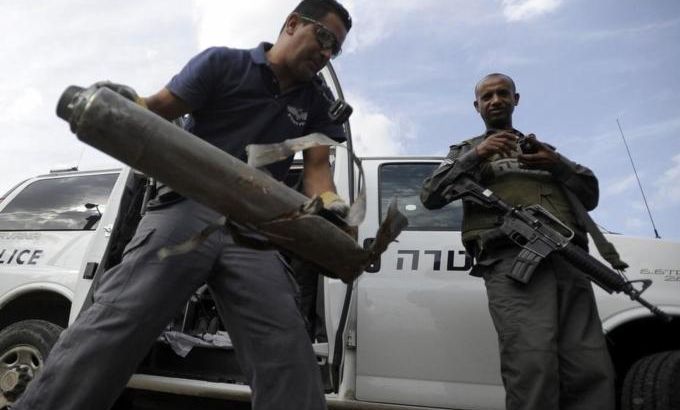Israel continues deadly Gaza air raids
Eight Palestinians killed as Israeli fighter jets hit Hamas government compounds, tunnels and power transformers.

Israel and Palestinian fighters have traded air strikes and rockets for a fourth day, with Israel hitting the Hamas prime minister’s office and also downing a rocket aimed at Tel Aviv.
The death toll from the conflict climbed on Saturday to 45: 40 Palestinians, at least 13 of them civilians, including women and children, and three Israeli civilians.
At least eight people were killed and dozens more injured by overnight attacks on the Gaza Strip.
Israel’s Iron Dome defence system intercepted late on Saturday a missile bound for greater Tel Aviv as sirens cut through the Jewish Sabbath quiet in the densely populated metropolis.
The rocket – the third aimed at Tel Aviv in three days – came as Israel’s Operation Pillar of Defence showed no sign of letting up, with the Israeli air force bombing targets in the Gaza Strip.
By early evening Israel had struck about 950 Gaza sites since Wednesday – a period during which more than 400 Palestinian missiles have also hit Israel.
An additional 240 rockets were intercepted and destroyed by Iron Dome, the Israeli military said.
A late Friday night meeting of the Israeli cabinet called on 75,000 Israeli reservists in the event of a ground incursion into the Gaza Strip.
Chris Bellamy, a London-based military analyst and director of the Greenwich Maritime Institute, told Al Jazeera that though the call on the reservists was “potentially hugely significant”, it remains highly unlikely that Israel will actually embark on a ground offensive.
The move, marking a seven-fold increase from the 2008-2009 Gaza war, is perhaps just a “warning signal” to Hamas that “Israelis are not happy” and are serious about a call to end rocket attacks, he said.
Tel Aviv targeted
With the missiles fired at Tel Aviv and Jerusalem, Hamas is now attempting to reach cities that had so far been spared from rocket attacks from the Gaza Strip, bringing around 3.5 million people – just under half of Israel’s population – into missile range.
Hamas claimed responsibility for Saturday’s rocket aimed at Tel Aviv, as it had for two fired at the city and one at Jerusalem since Thursday.
One of the targets destroyed in Israeli attacks early on Saturday was the office of Ismail Haniya, the prime minister of the Hamas government in Gaza.
Haniya was not in his office at the time. It was the building in which he had welcomed his Egyptian counterpart on Friday.
Israel also bombed the Hamas-run interior ministry, a police compound in Gaza City, more than 100 rocket launchers, and tunnels under the border with the Sinai Peninsula that are used for smuggling, an Israeli military spokeswoman said.
Meanwhile, the Israeli Haaretz daily, quoting senior Egyptian sources, reported that Egypt was leading intensive efforts to reach a ceasefire between Hamas and Israel.
There was no confirmation of this report, and no obvious indication that either side was easing its attacks.
Israel began the offensive on Wednesday with an air strike that killed the head of Hamas’ military wing, Ahmed Jaabari.
It was approved after days of rocket attacks on southern Israel by the Islamic Jihad, Hamas and other armed groups.
Ehud Barak, Israeli defence minister, approved on Friday a military request to increase the number of reservists it could mobilise, to 75,000 according to media reports.
It remained unclear whether Israel would expand its operation by sending ground troops into the Gaza Strip.
Israel said it was keeping the Erez crossing point, on the northern border of the Gaza Strip, open.
In southern Gaza, Israeli aircraft went after the hundreds of underground tunnels used to smuggle in weapons and other contraband from Egypt, people in the area reported.
A huge explosion in the area sent buildings shuddering in the Egyptian city of El-Arish, 45km away, an Associated Press news agency correspondent reported.
The tunnels have also been a lifeline for residents of the area during the recent fighting, providing a conduit for food, fuel and other goods after supplies stopped coming in from Israel days before the military operation began.
Missiles also knocked out five electricity transformers, plunging more than 400,000 people into darkness, according to the Gaza electricity distribution company.
Arsenal restocked
Hamas was badly bruised during the last confrontation with Israel four years ago, but has since restocked its arsenal with more and better weapons, and has been under pressure to prove its commitment to armed struggle against Israel.
As the fighting raged on, Rafik Abdessalem, Tunisian foreign minister, paid a three-hour visit to Gaza on Saturday and called on Israel to stop its offensive.
“What was allowed in the past will not be allowed now, because of developments in the Arab world,” he said.
“What is going on in Gaza now is unacceptable, unjustified and violates international law.”
On the diplomatic front, Egyptian President Mohamed Morsi held talks in Cairo with Recep Tayyip Erdogan, Turkish prime minister, and Qatar’s Emir Hamad bin Khalifa Al Thani to discuss how to end the violence.
Arab League foreign ministers met later on Saturday in Cairo for emergency talks to consider a request to Egypt and Jordan to downgrade their diplomatic ties with Israel, according to Egyptian state-owned newspaper Al Ahram.
Meanwhile, the Palestinian delegation in Washington criticised the US response to the Israeli raids as “at best biased and weak because it completely ignored the fact that Israel started the escalation”.